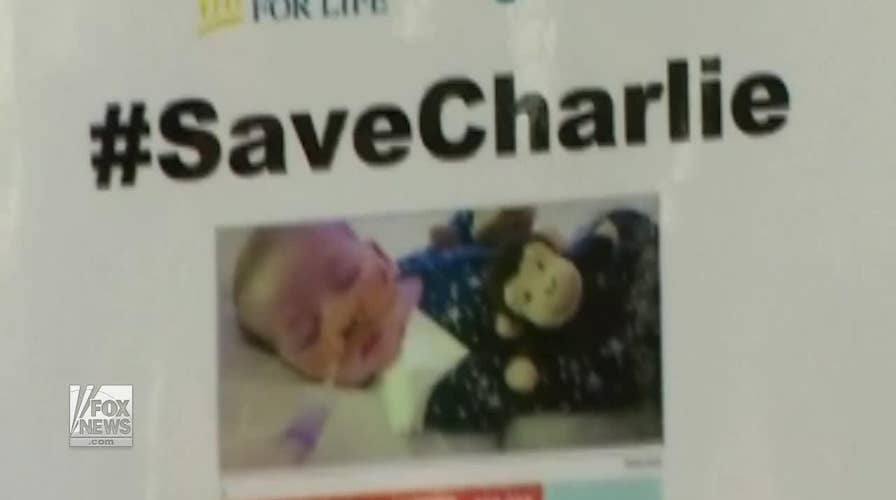Charlie Gard case: What causes the baby’s rare disease?
Charlie Gard is suffering from encephalomyopathic mitochondrial DNA depletion syndrome. It’s so rare the National Institutes of Health say only 15 infants have it in the world. Find out what causes it
On Monday, Dr. Michio Hirano, a neurologist at Columbia University, will evaluate 11-month old Charlie Gard, the British boy who is on life support because of a rare, lethal disease called mitochondrial depletion syndrome.
Charlie is at the center of a fraught legal case in the U.K. concerning whether his parents can take him abroad to receive experimental treatment. Doctors at the hospital treating Charlie have said that every medical treatment option has already been explored, and have advised against transferring him abroad.
CHARLIE GARD: US DOCTOR MEETS WITH UK SPECIALISTS TREATING TERMINALLY ILL BOY
Hirano testified via videolink on Thursday in the case. The treatment he is developing, called “nucleoside bypass therapy,” is so experimental that it is not being tested in any clinical trial in the U.S., has never been tried in anyone with Charlie’s specific form of mitochondrial disease, and required federal approval for an American child (with a related disorder) to receive it under a “compassionate use” waiver.
Here’s what else is known about nucleoside bypass therapy:
What is it supposed to do?
The therapy supplies the building blocks of DNA. Charlie has a mutation in a gene called RRM2B, which codes for the production of an enzyme that helps produce the four “letters” (nucleotides) that constitute DNA in mitochondria.
A mutated gene produces a dysfunctional enzyme; without a functional enzyme, mitochondria can’t replace DNA that’s damaged or deteriorated. Eventually, mitochondria — and the cells they power — stop working, with devastating effects especially on cells of the muscles and brain. Nucleosides are precursors to nucleotides; they’re turned into the latter in the body, providing the missing components of DNA.
Has anyone else gotten the therapy?
Hirano told a recent science meeting that 18 patients, most of them in Spain and Italy, are receiving nucleoside bypass therapy. At the June Mitochondrial Medicine symposium, which drew some 330 researchers and physicians to Alexandria, Va., Hirano described the research, two people who attended the meeting told STAT. (Hirano, a neurologist who specializes in neuromuscular diseases, did not reply to requests for comment and Columbia declined to answer any.)
CHARLIE GARD'S DISEASE AND LEGAL CASE: AN EXPLAINER
Nucleoside therapy “seems to be safe and well tolerated,” said Charles Mohan, Jr., CEO of the United Mitochondrial Disease Foundation, a patient advocacy group that funds research and which organized the Alexandria meeting.
Are the 18 patients like Charlie?
Not exactly. They all have a mutation in the TK2 gene, not RRM2B. Both mutations produce mitochondrial DNA depletion. The most publicized TK2 patient is Arturito Estopinan, who was born with TK2 disease in 2011 and has been treated by Hirano since he was 1. At first Arturito received nucleotides, the actual building blocks of DNA, but after two years he was switched to nucleosides, which are better able to survive the gastrointestinal tract and reach cells and their mitochondria.
Arturito’s respiratory function and strength have improved noticeably on nucleoside therapy, Art Estopinan, his father, said: He can now move his fingers, hands, and toes, and sit (with support) at a 90 degree angle for 90 minutes compared to a 45 degree angle for 15 minutes previously.
How could Charlie receive nucleoside therapy?
Under a “compassionate use” exemption from the U.S. Food and Drug Administration, a program that allows patients who are otherwise out of options to receive experimental drugs that have not been approved by the FDA, he could receive the therapy in New York City. (Columbia said on July 6 that it is willing to treat Charlie.) It doesn’t involve any red tape: The FDA typically okays such use in a single phone call with the scientist.
NEWBORN CONTRACTS LIFE-THREATENING ILLNESS FROM KISS, PARENTS CLAIM
Hirano is expected to examine Charlie Monday and Tuesday, after which Hirano could make the request to the FDA.
Is anyone going to put nucleoside therapy to a rigorous test?
“A proper clinical trial has not started,” said Dr. Fernando Scaglia, professor of medical and human genetics at Baylor College of Medicine. A biotech investment company called Aceras BioMedical has been asking physicians who treat patients with mitochondrial disease if they would be willing to participate in a clinical trial of nucleoside therapy for TK2 patients like Arturito, perhaps as early as next year. “But no one is talking about RRM2B,” the form of the disease that Charlie (and reportedly only 15 other patients in the world) has, Scaglia added.

